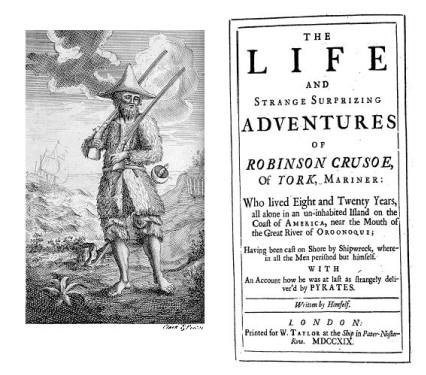|
ROBINSON CRUSOE

The best known of Defoeís novels is undoubtedly Robinson Crusoe [E1] [E2] [I1] [F1] [ES1] . The book is thought to be based on a real event: the experiences of Alexander Selkirk, a seaman who, in 1704, was put ashore on the desert island of Juan Fernandez, in the Pacific Ocean, from which he was rescued in 1709. Defoe may certainly have read the account of Selkirkís adventures, but he also drew inspiration from some of the travel books so fashionable in his time. Robinson Crusoe, in fact, is a travel novel which, though not divided into chapters, is actually made up of three separate sections.
Here is the plot:
- the first section relates how, in spite of his fatherís warning, at nineteen, Robinson left his family and went away to sea to make a fortune, and how, after many dangerous experiences, he landed in Brazil, where he became a successful planter. But one day, during an expedition to Africa to buy some slaves for his plantation, he was shipwrecked on a remote island;
- the second section describes Robinsonís life on the island, where he spent twenty-eight years, two months and nineteen days, during which he kept a journal where he recorded what happened to him almost day after day;
- The third describes Robinsonís return to Europe, where he learnt that his Brazil plantation still intact had made him rich, and where he met a lot of new adventures.
The bulk of the work is the second part, which is actually in the form of a diary-like account of Robinsonís experiences, of how he was able to partly re-create the world he had left behind him, how he eventually saved a young savage from the cannibals and made him his servant with the name of Man Friday, and how he was finally rescued by an English ship which took him back to England.
The work is one of the best examples of pure fiction able to intrigue the reader with its matter-of-fact style.
 6/15
6/15

|